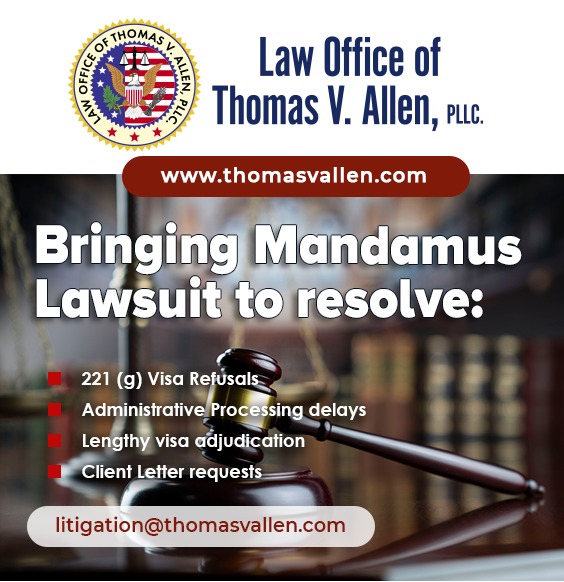 When your visa applications are not being processed by the consulates overseas in a timely manner, and when the applications are temporarily denied and placed on hold under Section 221(g) of the Immigration and Nationality Act, other than waiting, there is essentially only one action that the applicant can take to force the government to act — file a lawsuit.
There is no set timeline or S.L.A. for 221(g) processing. It totally depends on the case, and it can take as little as a week, or as much as several months or years. It is tough to know how much time it will take for them to come to a decision on your visa stamping case. But if you have a visa application that is pending for more than 3 months after the interview date or after initiating the drop box, you could be a potential plaintiff and could force the consulates to make a decision on your visa application.
This type of lawsuit, known as a “writ of mandamus”, is a request to the U.S. Federal District Court to compel the government to perform a duty owed to the plaintiff and to take action on the pending visa application. Once you have paid the visa processing fees, the government has an affirmative obligation to make the decision within a “reasonable time”. These obligations and the judicial power to enforce these obligations are outlined in the law (28 U.S.C. § 1361 and in the Administrative Procedures Act at 5 U.S.C. §§ 702, 706).
From our firm’s experience, the Federal Court can oblige the U.S. Consulate to review your visa application and make a final decision within a short period (usually within sixty days).
Upon receiving a complaint filed with the Federal Court, the government must answer within sixty days of the complaint. Often, the Assistant U.S. Attorney charged with defending the lawsuit will contact the consulate, find out the problem, and work to resolve it — usually within days of receiving the lawsuit.
Due to the recent surge in litigation for the 221(g) delays, the U.S. Attorneys are now taking the entire 60 days to have the U.S. Consulate decide on the visa application.
Our office has successfully filed mandamus lawsuits against USCIS, and U.S. Consulate delays in adjudication and has been successful in getting the visa adjudicated (“Prior results do not guarantee a similar outcome").
We are seeking plaintiffs who are experiencing significant delays in obtaining the visa due to the 221(g) delays and pending administrative processing. Please reach out to our office for more information at litigation@thomasvallen.com
When your visa applications are not being processed by the consulates overseas in a timely manner, and when the applications are temporarily denied and placed on hold under Section 221(g) of the Immigration and Nationality Act, other than waiting, there is essentially only one action that the applicant can take to force the government to act — file a lawsuit.
There is no set timeline or S.L.A. for 221(g) processing. It totally depends on the case, and it can take as little as a week, or as much as several months or years. It is tough to know how much time it will take for them to come to a decision on your visa stamping case. But if you have a visa application that is pending for more than 3 months after the interview date or after initiating the drop box, you could be a potential plaintiff and could force the consulates to make a decision on your visa application.
This type of lawsuit, known as a “writ of mandamus”, is a request to the U.S. Federal District Court to compel the government to perform a duty owed to the plaintiff and to take action on the pending visa application. Once you have paid the visa processing fees, the government has an affirmative obligation to make the decision within a “reasonable time”. These obligations and the judicial power to enforce these obligations are outlined in the law (28 U.S.C. § 1361 and in the Administrative Procedures Act at 5 U.S.C. §§ 702, 706).
From our firm’s experience, the Federal Court can oblige the U.S. Consulate to review your visa application and make a final decision within a short period (usually within sixty days).
Upon receiving a complaint filed with the Federal Court, the government must answer within sixty days of the complaint. Often, the Assistant U.S. Attorney charged with defending the lawsuit will contact the consulate, find out the problem, and work to resolve it — usually within days of receiving the lawsuit.
Due to the recent surge in litigation for the 221(g) delays, the U.S. Attorneys are now taking the entire 60 days to have the U.S. Consulate decide on the visa application.
Our office has successfully filed mandamus lawsuits against USCIS, and U.S. Consulate delays in adjudication and has been successful in getting the visa adjudicated (“Prior results do not guarantee a similar outcome").
We are seeking plaintiffs who are experiencing significant delays in obtaining the visa due to the 221(g) delays and pending administrative processing. Please reach out to our office for more information at litigation@thomasvallen.com
Subscribe to Our Newsletter
Access insight, news and updates from across the Thomas V. Allen




 Appointment With
Appointment With